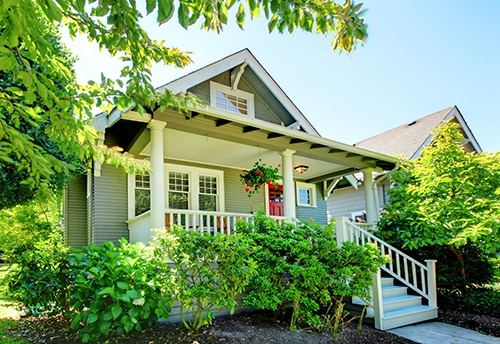
When you get a mortgage to buy a home it’s important to understand the breakdown of your monthly mortgage payment. This will help you keep track of your finances, and to help you figure out your timeline of when you should be able to pay off your Utah home loan.
The Different Costs
Of course, you pay your mortgage each month, but have you ever taken a deep dive into what your mortgage payment actually includes? There’s a handy acronym to help you remember what’s all incorporated in your monthly mortgage payment—PITI. Let’s take a look.
Principal
This is the total amount of money you’re borrowing. If your loan is for $200,000 then your principal is $200,000. As mortgage payments are made, the principal is reduced. Besides paying your mortgage on time each month, there are other ways to reduce your principal like making one additional payment each quarter (or even per year). Make sure you specify that your extra payment is mean to be put only toward the principal.
Interest
This is the amount you pay your lender for borrowing money. The interest rate on your loan is dependent on what’s going on in the market at the time your loan is secured. It can also be impacted by your personal credit history and other factors like your down payment amount, loan term, and loan amount.
When you get a mortgage, there are two main types:
-
A fixed-rate mortgage will have the same interest rate for every payment throughout the life of the home loan.
-
An adjustable-rate mortgage (ARM) has an interest rate that can change throughout the life of the loan. These changes are based on fluctuations of publicly-used indexes like the Federal Treasury rates or the LIBOR.
If you’re interested in seeing how different interest rates can impact your overall home loan, check out our mortgage calculators.
Taxes
This is based on your property value. Each year your property will be assessed for tax purposes and a payment is due. Keep in mind, taxes are not based on market values only assessed values set by a property assessor who will tell your local government what your property is worth. Most people choose to include their property taxes in their monthly mortgage payment. The taxes ended up being divided into 12 payments (one per month) and held in your escrow account until taxes are due and then paid on your behalf.
You should get a mailed notification updating you of your property tax amount each year so you can retain for your records. Your property value will more than likely change through the years of owning your home. You’ll be notified of any changes each year.
Insurance
Everyone who buys a house must have homeowner’s insurance. Just like property taxes, your homeowner’s insurance can be divided into 12 payments (one per month) and held in your escrow account until they’re due to be paid to directly to your insurance company on your behalf. Home insurance helps protect your home in the event of a disaster or accident (like a fire, wind, or a hail storm).
Depending on your situation and loan type, you may have additional requirements added to your monthly mortgage payment like Private Mortgage Insurance (PMI) or Mortgage Insurance Premium (MIP) and Homeowner’s Association (HOA) fees.
PMI
If you don’t put 20% down when you purchase your home with a conventional loan, you’ll be required to pay Private Mortgage Insurance each month. PMI drops off automatically when your mortgage balance reaches 78% on your primary residence. You may request removal of PMI at 80% of your balance but you’ll need to first have your home appraised.
Remember, if you miss any mortgage payments it may be harder to remove PMI at 80%. Note that these PMI rules don’t apply to second homes and investment properties.
MIP
If you get an FHA loan, the insurance structure is a little different. Since the down payment on this type of loan can be as little as 3.5% of the total purchase price, Mortgage Insurance Premiums are required for all FHA loans. MIP is calculated every year and is paid once a month.
HOA Fees
These are fees that are usually paid monthly (sometimes quarterly) to your neighborhood homeowner’s association. The association dues assist with neighborhood amenities and any maintenance of common areas, shared structures and/or exteriors.
HOA fees vary drastically so make sure you ask your real estate agent about this when you are home shopping. It’s important to note that not every neighborhood has HOA fees.
For questions about your monthly mortgage payment or to start your Utah home loan, click here.
